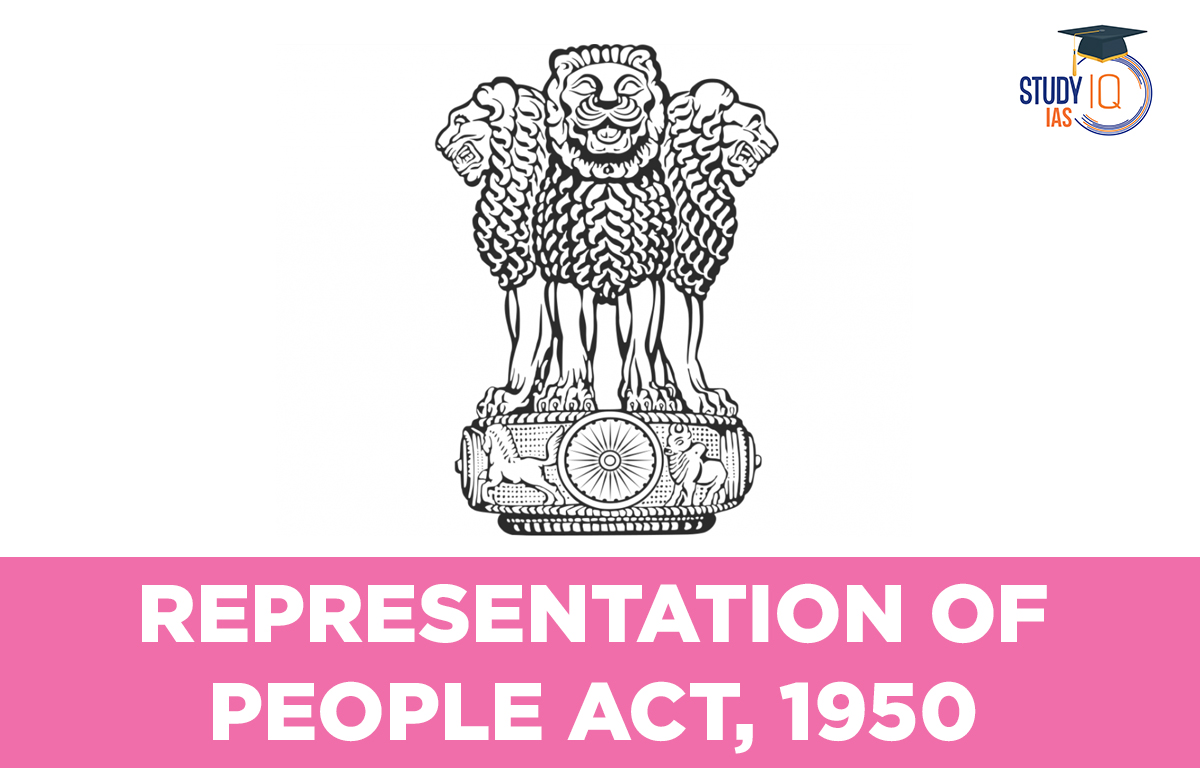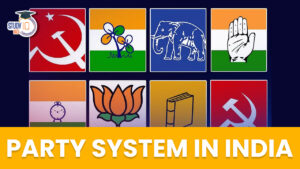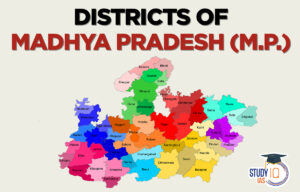Table of Contents
Representation of People Act, 1950
Free and fair elections are essential for democracy. To ensure this, the Constitution includes Part XV (Articles 324-329), which empowers Parliament to create laws for the electoral process. The Election Commission of India (ECI) is responsible for overseeing fair elections, as established by Article 324. To support this, Parliament enacted the Representation of the People Act (RPA) in 1950 and 1951.
| Acts |
| Parliament passed the RPA in 1950 and 1951 to provide a legal framework for elections, along with the Delimitation Commission Act of 2002.
Delimitation: For the first general elections to the Lok Sabha and state assemblies, the President, in consultation with the ECI and Parliament, issued the first delimitation order in August 1951. |
| Provisions of RPA, 1950 |
|
The President can amend constituency orders only after consulting the ECI. The Lok Sabha reserves seats for Scheduled Castes and Scheduled Tribes, and the ECI decides on reserved constituencies in states like Meghalaya, Mizoram, Nagaland, and Tripura.
The Representation of the People Act 1950 is an important part of Indian Polity which is an important subject in UPSC Syllabus. Students can also go for UPSC Mock Test to get more accuracy in their preparations.
Representation of People Act, 1950 History
General elections were required to choose a truly representative government based on adult universal suffrage after the country gained independence. No one should be denied the right to participate in or claim participation in a special electoral roll on the grounds of their religion, race, caste, or sex, according to Article 325 of the constitution, which guarantees universal suffrage.
As a result, on November 26th, 1949, the ECI was founded as a separate constitutional entity. To establish a legislative basis for the holding of elections, Parliament passed the Representation of the People Act of 1950, the Representation of the People Act of 1951, and the Delimitation Commission Act of 2002. For the first general elections to the Lok Sabha and Vidhan Sabha, the President issued the first delimitation order in August 1951 after consulting with ECI and receiving Parliament’s assent.
Also Read: State Human Right Commission
Representation of the People Act of 1950 Provisions
Delimitation is the process of setting boundaries for electoral constituencies in a country or region with a legislative body. The Delimitation Commission in India is a powerful body responsible for this task, and its orders have the force of law, meaning they cannot be challenged in court. These orders take effect on a date specified by the President of India. India has established Delimitation Commissions four times 1952, 1963, 1973, and 2002. The Commission’s main role is to redraw the boundaries of Lok Sabha and assembly constituencies based on the latest census. The Election Commission then consolidates these orders into a single document known as the delimitation of parliamentary and assembly constituencies order.
The election rules are part of the Representation of the People Act of 1950. They cover how seats are distributed in the House of Representatives, State Legislative Assemblies, and State Legislative Councils, as well as how constituencies are defined. Election officials include chief electoral officers, district election officers, and electoral registration officers. The Act also outlines the electoral lists for Parliament, Assemblies, and Councils. It describes how delegates from union territories can fill seats in the Council of States and includes provisions for local authorities in state legislative council elections. Additionally, it prevents civil courts from interfering in election matters.
| Articles | Provisions |
| Article 82 | Upon the completion of each census, the allocation of seats in the House of the People shall be readjusted by Parliament. |
| Article 170 | Upon the completion of each census, the Legislative Assembly of each State shall be readjusted by the Parliament. |
Delimiting Constituencies
Only after consulting the ECI may the President of India change orders defining constituencies. Scheduled Castes and Scheduled Tribes are entitled to seats in the Lok Sabha. The ECI has the power to choose which districts in Meghalaya, Mizoram, Nagaland, and Tripura would be designated for scheduled tribes.
Allocation of Seats
Each state is represented in the Lok Sabha to the fullest extent feasible in proportion to its population as indicated by census data.
Electoral Rolls
The 1950 Act permits those who hold a service qualification, such as a member of the armed forces, a member of a state’s armed police force serving outside the state, or central government employees posted outside India, to be registered on electoral rolls. Wives of these individuals are also considered to be ordinarily residents in India as determined by the President in consultation with the ECI. The term “wife” would be changed to “spouse” in order to gender-neutralize some clauses.
Chief Electoral Officer (CEO)
To oversee the election operations in the state/UTs, the ECI will nominate or appoint a CEO for each state in cooperation with the state government. The ECI also appoints or designates a state official as the District Election Officer (DEO) in conjunction with the state government. The CEO is ultimately in charge of and oversees the DEO’s work.
Electoral Registration Officer (ERO)
The task of creating the electoral rolls for each constituency (parliamentary or assembly) is under the purview of the ERO. The District Magistrate is currently hearing an appeal over a decision made by the ERO during the electoral roll update.
Returning Officer (RO)
The RO oversees the election in a constituency and nominates a winner. The ECI appoints or designates a government official or local authority as the RO after consulting with the state government.
Power to make rules
The act grants the Central government the authority, which it may then use after consulting with the ECI. Also, the Civil Courts are not permitted to contest the constitutionality of any ERO electoral roll amendment action.
Voting Rights
Voting rights were granted to Indian nationals residing overseas in 2010.
Also Read: National Human Rights Commission
Allocation of Seats to Constituencies Under the RPA 1950
The four schedules of the RPA 1950 outline how seats are allocated and how elections are conducted for different positions:
- First Schedule: Details the allocation of Lok Sabha seats for states and reserves seats for Scheduled Castes and Scheduled Tribes.
- Second Schedule: Lists the total number of seats in each State’s Legislative Assembly.
- Third Schedule: Describes how seats are allocated in State Legislative Councils.
- Fourth Schedule: Covers local authorities involved in Legislative Council elections.
Method of Election: All Lok Sabha seats are filled through direct elections from parliamentary constituencies in the states.
Representation of the People Act of 1950 Significance
It was passed in order to set voter requirements, specify the process for creating electoral rolls, and specify how seats would be filled. It also outlines the allocation of seats and the delineation of constituencies. Since then, this Act has undergone various amendments, the most recent of which was made in 2017.
The Act permits common citizens to register on a constituency’s electoral rolls. These people include those with a service qualification (such as members of the armed forces, armed police from a state serving outside the state, or central government employees posted outside India), as well as those who hold certain offices in India that the President has declared after consulting the Election Commission. According to the Act, the wives of such people are likewise considered to be ordinarily residing in India. In the 2017 modification, the word “spouse” was used in place of “wife.”
In a direct and participatory democracy, voters can select their leaders because elections are held at the constituency level. With the aid of a delimitation commission, MPs and MLAs are chosen based on population to ensure equity. The election rolls are updated often to ward off ghost and fake voters. Politics is decriminalized by sections like 8(4), which forbids the entry of members with a criminal history. By forbidding candidates from influencing voters with financial support, it promotes free and fair elections. Serve as a deterrent for candidates to stay clear of wrongdoing and corruption and to behave in the public interest.
Representation of the People Act of 1950 Criticism
Due to a lack of independent staff and a separate secretariat for its own operations, the Election Commission of India (ECI) has difficulty carrying out its duties since it lacks the necessary authority. India has a legislative framework to enforce internal party democracy, not even the RPA act, in contrast to Germany and Portugal.
Candidates fail to disclose their assets and liabilities even though the Supreme Court and the RPA demand them to. RPAs lack explicit laws and instructions on issues connected to the abuse of official apparatus that offers the ruling party an unwarranted electoral advantage. Under the RPA legislation, false affidavits or a significant suspension are not grounds for election violations.
Representation of the People Act of 1950 UPSC
India must have a mechanism to defend people’s interests and electors must act in the best interests of the people rather than their own self-interest as a democratic nation where people elect their representatives. Parliament passed the Representation of the Peoples Act (RPA) with these factors in mind. Students can read all the details related to UPSC by visiting the official website of StudyIQ UPSC Online Coaching.


 Party System in India, Feature, Importan...
Party System in India, Feature, Importan...
 Consolidated Fund of India, Meaning and ...
Consolidated Fund of India, Meaning and ...
 Districts of MP List, Name, Importance, ...
Districts of MP List, Name, Importance, ...





















